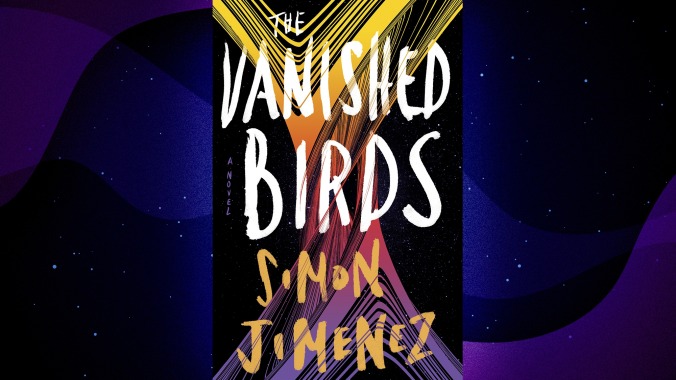
The Vanished Birds opens with a tale about a boy who falls in love with a space captain. She visits his planet every 15 years, though only eight months pass for her between trips. It’s a bittersweet story about growing up and living with regret, and provides a clever way to introduce the book’s protagonist, Captain Nia Amani, through the eyes of another character.
Writer Simon Jimenez doesn’t use this technique only in the prologue of his debut novel. Reaching backward and forward in time to span more than a millennium, he tells numerous stories of loves found and lost. There’s the tale of Fumiko Nakajima, the brilliant engineer who falls in love just before starting the project that will allow humanity to escape a dying Earth; she then spends many lifetimes trying to recreate the woman she left behind. There’s Ahro, a teenager who seemingly fell from the sky and into Nia’s care, who shrugs off his near-mythic destiny to have sex with another teenage boy he’ll never be able to see again. Each tale is powerful in its own right, the structure making the novel feel more like a collection of interconnected short stories.
Primarily set in the third millennium, The Vanished Birds imagines a world where rising temperatures and mass extinctions have forced humanity to flee to the stars. The companies that created the space stations and colonized the planets where most people live exercise enormous power and influence, turning entire worlds into plantations where farming cash crops is the only viable way of life. Nia works for Umbai, the most powerful of these corporations, living as a woman out of time with only her crew and fellow captains aging at the same rate she does. But when she takes responsibility for the traumatized Ahro, who communicates primarily through music, she finds the chance to make up for past mistakes and create a new family.
The book also has a musical quality, picking up tempo and then slowing down before returning to familiar beats. Months or years can pass in a blink; then whole pages are dedicated to the span of just a few hours. With Nia as a constant, the shift in time arms the author with a novel way to hurt her, and to affect readers. Jimenez knows just how to give each supporting character enough space to make them feel essential to the story and Nia’s makeshift family. The time difference means that a crew member choosing to take a new job removes them from the story just as definitively as when someone is killed in a dramatic space battle.
The Vanished Birds is at its best when it’s most intimate, spinning a story filled with romance, much of it queer, along with platonic relationships that demonstrate the power of found families. While most of the book’s characters are damaged by past tragedies and feel the heavy burden of regret, the heroes are those who work together to build and nurture something new rather than trying to reconstruct what they’ve lost.
The evils of the past also loom large in the book’s aggressively anti-capitalist message. Technology may have advanced significantly, but society hasn’t, and the rich and powerful are still exploiting others and burning resources. At one point, Umbai introduces a new technology that makes space travel significantly faster. When it’s discovered to be powered by blood, there’s some uproar about ethics, but it is still largely accepted. It’s a blunt metaphor, but no less realistic for it.
The disconnected nature of The Vanished Birds means that it sometimes feels like less than the sum of its parts. It’s easy to want a reprise of the book’s stronger interludes, like the drug-addled journal entries of Satoris Moth, a socialite desperately trying to prove his worth to Nia and her crew. Jimenez instead moves on in an attempt to heighten the drama, with the final crescendo feeling rushed, leaving little time for denouement.
Like any musical, not all the pieces in The Vanished Birds work equally well. But it’s still an impressively ambitious debut novel, promising a future where humanity might improve by learning from its past failings. The snapshots Jimenez provides of people, places, and time in his sprawling world leave the door open for more elaborate portraits to come.
1 Comment
I finished the book a couple days ago. I thought it was fantastic — both heart-wrenching and reaffirming. That last sequence was sweeping, breathtaking, like the final movement of a major symphony.